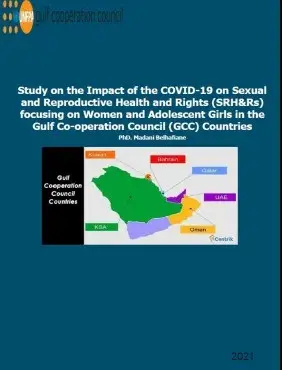Several factors converged throughout the COVID-19 pandemic, which reduced the use of health services. These factors were mainly related to the mobilization of the entire health system to fight the pandemic, people's fear of being infected if they attend health facilities, and the concerns of health workers that they may jeopardize their safety if exposed to the disease. This potential disruption of health services has been affecting the sexual and reproductive health accessibility and the modalities of work in this area. In this perspective, UNFPA, the sub-regional office for GCC countries, has commissioned a regional senior expert to issue a paper titled “Study on the Impact of the COVID-19 on Sexual and Reproductive Health and Rights (SRH&Rs) focusing on Women and Adolescent Girls in the Gulf Co-operation Council (GCC) Countries” to assess the impact of the COVID-19 pandemic on the service delivery of sexual and reproductive health facilities in the GCC countries and to what extent the rights of women and adolescent girls in terms of accessibility to reproductive health services in these countries . This study will result in a set of recommendations which be shared with the governments in the region, to ensure that women and adolescent girl’s sexual and reproductive health rights are at the top of the development and pandemic recovery agenda, even in these extraordinary circumstances. This study also highlights the situation of SRH & RS in these countries and the gaps that could be identified, in addition to the areas of potential cooperation with UNFPA, as a leading UN agency. The study will also shed light on the needs and requirements of an integrated response that will support the continuity of these services in the current plans to respond to pandemic. It is intended to identify the possibilities for improve the integration of the COVID-19 dimension into the management of sexual and reproductive health services, including women's and adolescent girls' health, and ensuring accessibility to these services within the preliminary and dietary healthcare systems as part and parcel of the Universal Health Coverage (UHC) strategy. This study consists of a couple of sections. The first one highlights the goals of the paper, and the situation of the COVID-19 pandemic in the Gulf countries, which have, to a large extent, managed to control the infection rates and the pandemic associated waves, by mobilizing great human and financial resources. The second section consists of the essential elements to study the impact of COVID-19 on sexual and reproductive health services, focusing on women and adolescent girls' health. The main tasks of the consultant for the study were: Reviewing impacts on costing, budgeting, and financing for reproductive health services targeting women and adolescent girls in each country. Providing recommendations to the respective governments based on a situation analysis of the COVID-19 impacts. Highlighting the impact of the pandemic on UNFPA's mission to accelerate the implementation of global and regional commitments for access to SRH&RS. Providing a holistic situation analysis of the SRH services in these countries, and highlighting the gaps caused by the pandemic. Providing a qualitative and quantitative analytical review of the accessibility of the SRH&Rs to women and adolescent girls in the region based on the figures, data and statistics provided by official entities. Developing a risk analysis matrix related to the impact of the pandemic in this area of work. Developing a statistical and narrative knowledge product that can guide the future interventions of UNFPA GCC with the respective government entities to mitigate the impact of the pandemic in consideration of UNFPA’s mandate. Specifying the magnitude of the impact in an analytical approach and triangulating data that highlights the effect of the current situation on the MoHs undertakings in light of the ICPD25 and the Nairobi Summit Declaration. Identifying and reviewing the extent to which the national RMNCAH, ASRH&RS, school health, and maternal health strategies and plans reflect the SRH&RS needs of women and adolescent girls, as defined in the ICPD Program of Action (ICPD PoA), the Lancet Guttmacher Commission on SRH&RS and/or RMNCAH/SRH&RS strategy. 2 Assessing the impact of the strategies mentioned above and plans and drawing these conclusions supported by real-time statistics and data provided by the relevant partners and stakeholders. This study is designed as a generic manual that countries, implementing agencies, and NGOs can adapt to their needs. It also aims to develop a set of recommendations for GCC governments to ensure respect for women and adolescent girls' sexual and reproductive rights. It will shed some light on the Sexual and Reproductive Health & Rights (SRH&Rs) situation in the targeted countries, the gaps that can be identified, and the areas of potential cooperation with the UNFPA sub-regional office for GCC countries (UNFPA GCC).
Study on the Impact of the COVID-19 on Sexual and Reproductive Health and Rights (SRH&Rs) focusing on Women and Adolescent Girls in the Gulf Co-operation Council (GCC) Countries

Publisher
UNFPA GCC
Number of pages
63
Author
PhD. Madani Belhafiane
Technical Reports and Document
Study on the Impact of the COVID-19 on Sexual and Reproductive Health and Rights (SRH&Rs) focusing on Women and Adolescent Girls in the Gulf Co-operation Council (GCC) Countries
Publication date
30 November 2021

